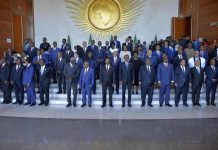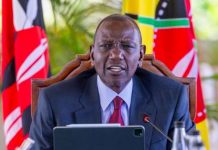Africa-Press – Kenya. As we draw the curtains on 2024 and usher in a brand new year, Kenya finds itself at a critical juncture. The political landscape has undergone seismic shifts, with President William Ruto’s government evolving into a coalition of erstwhile rivals.
Raila Odinga’s ODM and key figures from former President Uhuru Kenyatta’s circle now find themselves in the folds of the Kenya Kwanza administration. While this broadbased alliance purports to offer inclusivity, it has left many Kenyans literally open-mouthed.
The youth—millennials and Gen Z—remain restless, their frustrations fuelled by a confluence of challenges. Tribeless and leaderless, they are victims of an economic reality where the cost of living has spiralled beyond reach.
Rampant inflation, punitive taxation and stagnant wages have turned everyday life into a fight for survival. For a population that constitutes the majority of the workforce and electorate, the lack of opportunities is not only disheartening but also dangerous.
This demographic represents a ticking time bomb that, if ignored, could explode into social unrest. The promise of economic prosperity, captured in our national anthem, remains elusive.
Small businesses, the backbone of Kenya’s economy, are crumbling like dominoes under the weight of high taxes, expensive credit, incoherent policy and erratic service delivery systems.
Public debt has ballooned to unsustainable levels, leaving the government with little fiscal room to implement transformative programmes. Meanwhile, ordinary Kenyans are asked to shoulder the burden of austerity measures that seem to favour the political class.
Agriculture, which sustains millions, is hampered by erratic weather patterns and inadequate support from the government. Food prices are soaring, deepening the hunger crisis in many regions.
Infrastructure development, while visible, has often come at the expense of social services, leaving critical sectors such as healthcare and education severely underfunded.
The 2010 Constitution promised devolution as a solution to entrenched inequities. While counties have made strides in service delivery, corruption and mismanagement remain rife.
Billions allocated to devolved units disappear into the pockets of a few, with little accountability. Citizens’ hope for decentralised governance has been dimmed by a lack of political will to ensure transparency and equitable resource distribution.
At the national level, governance systems appear to be in a state of disrepair. Key institutions meant to safeguard democracy, such as the Judiciary, Parliament and the Ethics and Anti-Corruption Commission,
are under immense pressure. Political interference has eroded their independence, making justice a commodity for the powerful. Kenya’s human rights record in 2024 has been sullied by reports of police brutality, suppression of dissent and shrinking civic space.
Activists and journalists operate in an increasingly hostile environment, with fear of reprisal stifling the voices that hold power to account. This regression undermines the principles enshrined in the Bill of Rights, a cornerstone of the 2010 Constitution.
Corruption, the perennial blight on Kenya’s governance, continues unabated. Grand scandals involving billions of shillings make headlines with depressing regularity, yet accountability remains elusive.
The perception—and often the reality—that the political elite operate with impunity erodes public trust in government institutions. Despite promises of a “Hustler’s Economy,” inequality persists.
The wealth gap continues to widen, with a privileged few amassing immense riches while the majority languish in poverty. Shared prosperity remains a distant dream, and the sense of betrayal among ordinary Kenyans is palpable.
As 2025 opens its doors, it brings both challenges and opportunities. For Kenya to experience the hallowed promise of the 2010 Constitution, deliberate action is needed.
The constitution was a hard-won victory, symbolising the aspirations of a people who yearned for justice, equity and prosperity. Its principles and beacons must guide the nation forward.
To maximise the benefits of 2025 and beyond, Kenyans must fearlessly and consistently demand accountability and transparency and hold leaders to account through conscious and targeted civic engagement.
Public participation in governance must be more than a convention, it must influence decision-making. The independence of key institutions such as the Judiciary, anti-corruption agencies and oversight agencies, must be fiercely defended.
Only robust, value-led institutions can ensure checks and balances. While President Ruto’s New Year speech sought to inspire hope and confidence, it appears disconnected from the struggles and aspirations of the majority.
Bridging this gap requires not only rhetorical reassurances but tangible actions that directly improve the lives of citizens. The government must urgently address the economic hardships, systemic inequalities and governance
challenges that define the lived realities of the people it serves. Without this, the optimism of presidential speeches will remain an unattainable dream for many.
An independent media and an active civil society are essential to democracy. Safeguarding these spaces ensures that the government remains answerable to the people.
Beyond political coalitions, genuine inclusivity means addressing historical injustices and ensuring that marginalised communities have a seat at the table. Kenya stands at a crossroads. One path leads to deeper inequality and disillusionment; the other to renewal and progress.
For More News And Analysis About Kenya Follow Africa-Press






